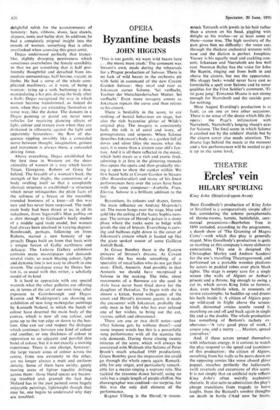OPERA
Byzantine beasts
JOHN HIGGINS
`This is too gentle, we want wild beasts here ... the music must crash.' The comment was Strauss's own, made during the rehearsals for a Prague production of Salome. There is no lack of wild beasts in the orchestra pit with Solti in command of the new Covent Garden Salome: they snarl and roar as Jokanaan curses Salome, `Sei verflucht, Tochter der blutschanderischen Mutter. Sei verflucht.' Even more savagery comes as Jokanaan repeats the curse and then retires to his cistern.
There is bestiality in the score, to say nothing of bestial behaviour on stage, but also the rich byzantine glitter of Wilde's original play. The imagery is consistently lush; the talk is of coral and ivory, of pomegranates and serpents. When Salome describes Jokanaan's body as a garden full of doves and silver lilies she means what she says, it is more than a sixteen year old's fan- tasy. And it is all there reflected in the music, which Solti treats as a rich and exotic fruit, admiring it at first in the glittering tremolo that opens the opera and then gradually slic- ing it open to show the canker within. We first heard Solti at Covent Garden in Strauss (Der Rosenkavalier) and many of his finest performances here over the years have been with the same composer—Arabella, Frau, Electra. Salome is a brilliant addition to the list.
Byzantium, its colours and shapes, forms the main influence on Andrzej Majewski's set. The moon hangs over the stage, blue and gold like the ceiling of the Santa Sophia mos- que. The terrace of Herod's palace is a stony place where the rocks seem to bulge with jewels the size of breasts. Everything is curv- ing and bulbous right down to the cover of Jokanaan's cistern which is hauled up like the giant spoked saucer of some Galilean Jodrell Bank.
In Grace Bumbry there is the Eastern princess of Strauss's dreams. At Covent Garden she has made something of a speciality of royal ladies who do not get their man : Eboli, Amneris. And possibly in that Amneris we should have recognised a Salome in the making. The lithe, silent movements of a Burmese cat she used in Aida have never been fined down for the daughter of Herodias. To begin with she is almost a kitten, bored with • games of the court and Herod's tiresome guests; it needs the encounter with Jokanaan, probably the only man in her life who has ever refused one of her wishes, to bring out the cat, vicious, selfish and obsessional.
There are one or two shrill notes—and what Salome gets by without them?—and some impure words but this is a powerfully sung performance with all the stamina the role demands–During those closing twenty minutes of the score, which will always be associated with Welitsch (the Salome of Peter Brook's much attacked 1949 production), Grace Bumbry gave the impression she could go through the whole opera again. Remark- able for any singer, and particularly remark- able for a mezzo singing a soprano role. She tackled the tiresome dance herself, using no veils but a single length of purple chiffon. No choreographer was credited—no surprise, for this was the only dull element of the performance.
Ragnar Ulfung is the Herod,9t -moon-
struck Tetrarch with jewels in his hair rather than a crown on his head, giggling with delight as his wishes—or at least some of them—come true. The high tessitura of the part gives him no difficulty: the voice cuts through the thickest orchestral textures with ease and the diction is perfect. Josephine Veasey is his equally mad and cackling con- sort; Jokanaan and Narraboth are less well cast. Norman Bailey has the voice for John the Baptist, ringing out from both in and above the cistern, but not the appearance. His shaggy locks would never have cast so formidable a spell over Salome and he never qualifies for the First Soldier's comment, -Tr ist ganz jung'. Ermanno Mauro is not strong enough for Narraboth and the suicide goes for nothing.
Here August Everding's production is at fault, as on one or two other occasions. There is no sense of the desire which fills the opera : the Page's infatuation with Narraboth, Narraboth's longing sheep's eyes for Salome. The final scene in which Salome is crushed not by the soldiers' shields but by the cistern cover also needs attention. The drama lags behind the music at the moment and a few performances will be needed to get it up to the same level,


































 Previous page
Previous page